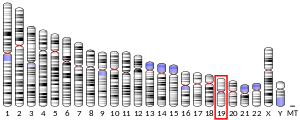PSG2
Pregnancy-specific beta-1-glycoprotein 2 is a protein that in humans is encoded by the PSG2 gene.[3][4]
| PSG2 | |||||||||||||||||||||||||
|---|---|---|---|---|---|---|---|---|---|---|---|---|---|---|---|---|---|---|---|---|---|---|---|---|---|
| Identifiers | |||||||||||||||||||||||||
| Aliases | PSG2, CEA, PSBG2, PSG1, pregnancy specific beta-1-glycoprotein 2 | ||||||||||||||||||||||||
| External IDs | OMIM: 176391 GeneCards: PSG2 | ||||||||||||||||||||||||
| |||||||||||||||||||||||||
| |||||||||||||||||||||||||
| Orthologs | |||||||||||||||||||||||||
| Species | Human | Mouse | |||||||||||||||||||||||
| Entrez |
| ||||||||||||||||||||||||
| Ensembl |
| ||||||||||||||||||||||||
| UniProt |
| ||||||||||||||||||||||||
| RefSeq (mRNA) |
| ||||||||||||||||||||||||
| RefSeq (protein) |
| ||||||||||||||||||||||||
| Location (UCSC) | Chr 19: 43.06 – 43.08 Mb | n/a | |||||||||||||||||||||||
| PubMed search | [2] | n/a | |||||||||||||||||||||||
| Wikidata | |||||||||||||||||||||||||
| |||||||||||||||||||||||||
References
- GRCh38: Ensembl release 89: ENSG00000242221 - Ensembl, May 2017
- "Human PubMed Reference:". National Center for Biotechnology Information, U.S. National Library of Medicine.
- Leslie KK, Watanabe S, Lei KJ, Chou DY, Plouzek CA, Deng HC, Torres J, Chou JY (Aug 1990). "Linkage of two human pregnancy-specific beta 1-glycoprotein genes: one is associated with hydatidiform mole". Proceedings of the National Academy of Sciences of the United States of America. 87 (15): 5822–6. doi:10.1073/pnas.87.15.5822. PMC 54420. PMID 2377620.
- "Entrez Gene: PSG2 pregnancy specific beta-1-glycoprotein 2".
Further reading
- Thompson J, Koumari R, Wagner K, Barnert S, Schleussner C, Schrewe H, Zimmermann W, Müller G, Schempp W, Zaninetta D (Mar 1990). "The human pregnancy-specific glycoprotein genes are tightly linked on the long arm of chromosome 19 and are coordinately expressed" (PDF). Biochemical and Biophysical Research Communications. 167 (2): 848–59. doi:10.1016/0006-291X(90)92103-7. PMID 1690992.
- Zoubir F, Khan WN, Hammarström S (May 1990). "Carcinoembryonic antigen gene family members in submandibular salivary gland: demonstration of pregnancy-specific glycoproteins by cDNA cloning". Biochemical and Biophysical Research Communications. 169 (1): 203–16. doi:10.1016/0006-291X(90)91455-2. PMID 2350345.
- Streydio C, Lacka K, Swillens S, Vassart G (Jul 1988). "The human pregnancy-specific beta 1-glycoprotein (PS beta G) and the carcinoembryonic antigen (CEA)-related proteins are members of the same multigene family". Biochemical and Biophysical Research Communications. 154 (1): 130–7. doi:10.1016/0006-291X(88)90660-2. PMID 3260773.
- Trask B, Fertitta A, Christensen M, Youngblom J, Bergmann A, Copeland A, de Jong P, Mohrenweiser H, Olsen A, Carrano A (Jan 1993). "Fluorescence in situ hybridization mapping of human chromosome 19: cytogenetic band location of 540 cosmids and 70 genes or DNA markers". Genomics. 15 (1): 133–45. doi:10.1006/geno.1993.1021. PMID 8432525.
- Colland F, Jacq X, Trouplin V, Mougin C, Groizeleau C, Hamburger A, Meil A, Wojcik J, Legrain P, Gauthier JM (Jul 2004). "Functional proteomics mapping of a human signaling pathway". Genome Research. 14 (7): 1324–32. doi:10.1101/gr.2334104. PMC 442148. PMID 15231748.
- Mennuni C, Calvaruso F, Facciabene A, Aurisicchio L, Storto M, Scarselli E, Ciliberto G, La Monica N (Nov 2005). "Efficient induction of T-cell responses to carcinoembryonic antigen by a heterologous prime-boost regimen using DNA and adenovirus vectors carrying a codon usage optimized cDNA". International Journal of Cancer. 117 (3): 444–55. doi:10.1002/ijc.21188. PMID 15906358.
This article is issued from Wikipedia. The text is licensed under Creative Commons - Attribution - Sharealike. Additional terms may apply for the media files.

